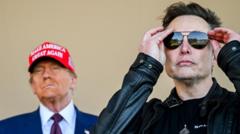In a twist of political fate, Elon Musk’s vocal opposition to a recent bipartisan proposal to fund the U.S. government has dramatically influenced Republican lawmakers, leading to internal discord and hindering progress towards avoiding a government shutdown. This week's events showcased how external figures, such as Musk and Trump, can disrupt traditional legislative processes and challenge the decision-making power within the party, which is already experiencing fractures and uncertainty amidst its narrow majority in Congress.
Earlier this week, as negotiations unfolded regarding a government funding bill aimed at preventing a partial shutdown, Musk took to social media to voice his disapproval of a deal brokered by House Speaker Mike Johnson. Musk's influence was palpable as communication escalated within the party, culminating in a failed vote as numerous Republicans sided with Democrats against the funding proposal. His remarks, which sometimes reinforced misleading narratives, appeared to catalyze a movement within the party, provoking Trump to articulate his own discontent with the legislation.
In light of this chaos, Speaker Johnson's leadership has come under scrutiny. Attempts to rally support for an alternative funding proposal following Musk's intervention stumbled, raising concerns about potential upheaval in House leadership as the party's internal dynamics come under strain. Some legislators openly questioned Musk's role in the legislative process, suggesting that his sway was not welcomed by all members of Congress.
Looking ahead, the scenario places considerable pressure on Trump and his ability to unify Republicans in both the House and Senate. With stakes high and the government shutdown looming, the Republican party must navigate its internal divisions while managing external pressures, including Musk's involvement. Failure to align on critical issues could render the party's legislative agenda vulnerable, putting the groundwork for Trump's presidency at risk.
As the deadline for a funding agreement approaches, Johnson's challenge is heightened—not only must he contend with the influence exerted by figures like Musk and Trump, but he also faces dissent within his own ranks regarding party unity and governance strategy. Democrat commentary on the situation, labeling Musk as a prominent but non-official player in the unfolding drama, underscores the extent to which political maneuvers outside traditional channels can reshape legislative outcomes.
With the future of Congressional leadership hanging in the balance and unsanctioned influencers like Musk playing pivotal roles, the path toward a consensus within the Republican party remains fraught with complexity and uncertainty. In the coming weeks, how these dynamics will shape the legislative landscape will be critical as lawmakers seek viable solutions to prevent a protracted government funding crisis.
Earlier this week, as negotiations unfolded regarding a government funding bill aimed at preventing a partial shutdown, Musk took to social media to voice his disapproval of a deal brokered by House Speaker Mike Johnson. Musk's influence was palpable as communication escalated within the party, culminating in a failed vote as numerous Republicans sided with Democrats against the funding proposal. His remarks, which sometimes reinforced misleading narratives, appeared to catalyze a movement within the party, provoking Trump to articulate his own discontent with the legislation.
In light of this chaos, Speaker Johnson's leadership has come under scrutiny. Attempts to rally support for an alternative funding proposal following Musk's intervention stumbled, raising concerns about potential upheaval in House leadership as the party's internal dynamics come under strain. Some legislators openly questioned Musk's role in the legislative process, suggesting that his sway was not welcomed by all members of Congress.
Looking ahead, the scenario places considerable pressure on Trump and his ability to unify Republicans in both the House and Senate. With stakes high and the government shutdown looming, the Republican party must navigate its internal divisions while managing external pressures, including Musk's involvement. Failure to align on critical issues could render the party's legislative agenda vulnerable, putting the groundwork for Trump's presidency at risk.
As the deadline for a funding agreement approaches, Johnson's challenge is heightened—not only must he contend with the influence exerted by figures like Musk and Trump, but he also faces dissent within his own ranks regarding party unity and governance strategy. Democrat commentary on the situation, labeling Musk as a prominent but non-official player in the unfolding drama, underscores the extent to which political maneuvers outside traditional channels can reshape legislative outcomes.
With the future of Congressional leadership hanging in the balance and unsanctioned influencers like Musk playing pivotal roles, the path toward a consensus within the Republican party remains fraught with complexity and uncertainty. In the coming weeks, how these dynamics will shape the legislative landscape will be critical as lawmakers seek viable solutions to prevent a protracted government funding crisis.




















